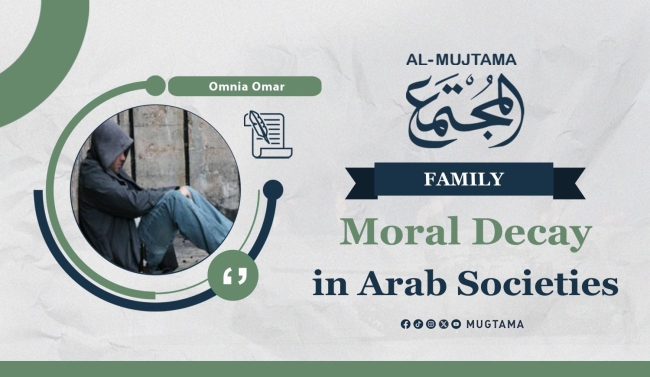Many indicators pointing to manifestations of moral decay in our societies can offer a profound insight into the breakdown of overall moral values in our Arab world.
For instance, the International Transparency Organization, in a recent report on its official website, shows that most Arab countries have failed to improve their positions on the Corruption Perceptions Index over more than a decade. The organization stated that according to the Corruption Perceptions Index for 2023, the average score for Arab countries was 34 out of 100, indicating a long road ahead to ensure integrity and justice across the region.
On the other hand, crime rates have risen in the Arab world. Yemen topped the list with 45 crimes per 1,000 people, while Syria recorded approximately 40 crimes per 1,000 people. According to a study by the “Taub” Institute on murder rates, if the Arab community were a country, it would rank third in terms of homicide rates after Colombia and Mexico. Last year alone, 223 Arab citizens were killed in circumstances related to violence and crime.
As to the family level, divorce rates have increased significantly across the Arab world. Kuwait ranked first with a divorce rate of 48% of total marriages, according to statistics published by the Kuwaiti Ministry of Justice. Egypt followed, with divorce rates rising from 7% to 40% over the past 50 years, resulting in 3 million divorced women. Jordan and Qatar ranked third and fourth, with divorce rates reaching 37.2% and 37%, respectively.
In 2022, Iraqi officials reported that over 50% of Iraqi youth take drugs, while in Egypt, this percentage decreased to 6% compared to a decade ago. Sudan faced a challenge in estimating drug addicts, with approximately 6 million addicts due to the widespread use of drugs among youth.
What happened to the Arab societies then?
Sociologists discuss that every society has a value model, which is the overall values that societies believe in, or the overall governing rules, established standards, and absolute principles that regulate, govern, and evaluate both positive and negative behaviors and activities within that society.
Values represent criteria for what should or should not be, shaping the nature and form of social systems according to these standards.
The model values and principles that the individual believes and embraces play a significant role in guiding their decisions, choices, behaviors, understanding of the world, and their place and role within it. Values also address existential questions in individuals' lives due to their encompassing of both spiritual and material aspects.
At the societal level, a system of values supports the cohesion of the social fabric by defining its overarching goals, ideals, and steadfast principles and aiding in navigating changes and challenges. It helps preserve the identity and unique character of societies, preventing them from being diluted by external influences like westernization, orientalism, and cultural and intellectual invasions. Values also provide societies with a cognitive foundation that becomes ingrained in the minds of its members, shaping how they interact with the world and defining their purpose and justifications for existence.
Religion, innate nature, reason, and social norms are sources from which Arab societies derive their values. These values are transmitted to individuals through various upbringing and social guidance institutions such as families, mosques, churches, educational institutions, the media, and others. Therefore, the stability of the social model against decay depends significantly on the clarity of its sources and the strong societal presence of its upbringing and guidance institutions.
However, the modern era we live in is characterized by constant movement, speed, and unprecedented technological advancement, which has reduced temporal and spatial gaps and accelerated the spread of ideas and products, leading to the intermingling and interaction of value modules. However, this dynamic has necessitated the change itself to become a value and a goal.
Identity Questions
The first step towards boarding the ever-changing train of transformation is when individuals reject the values they once believed in and detach from their previous affiliations, especially those characterized by stability and continuity, such as religion, tribe, family, and others. At that point, individuals become solitary figures, losing their membership in the nurturing environments that once offered them support and granted them answers for identity, the meaning of life, and purpose, embarking on a profoundly individual journey to find these answers. However, there are no definitive answers because change in both the era and human beings is unstoppable, instilling everything with a relative nature. Values lose their meaning and consequently fail to fulfill their roles on both individual and societal levels.
In addition to these global changes, each society undergoes specific transformations due to factors like political and economic situations and their societal repercussions. These factors, along with others mentioned, impact the sources and content of values themselves, as well as the roles entrusted to upbringing institutions, leading to what is known as moral decay.
Moral decay is a process of dismantling the overall moral vision and governing normative rules of a society, driven by rapid political, economic, and social changes at various levels. This results in societal disruptions that manifest in the behavior of individuals and groups.
Thus, the statistics we began this article with reflect a state of moral decay that has affected Arab societies across all levels. This is due to the breakdown of the governing moral model of these societies, leading to a state of moral and behavioral disruption. This necessarily prompts questioning the changes that led to the breakdown of this model on the one hand and questioning the model itself on the other hand, assessing its societal effectiveness in dealing with these changes. This process of accountability represents the first step in answering the question: What is the solution?
-------------------------------------------------------------


